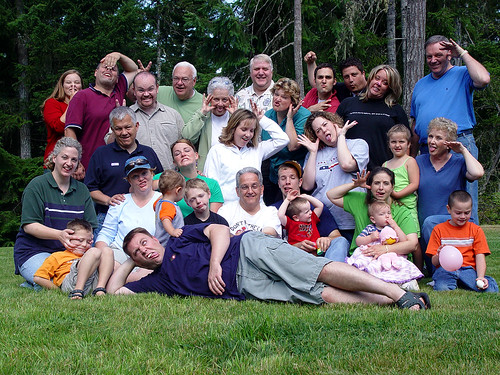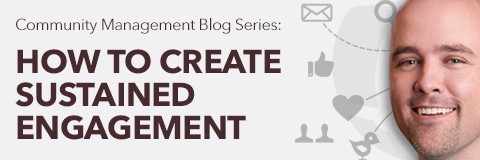
In my day job at DNN, I spend a lot of time creating
marketing content around our
online community solution. As a result, I read a
lot of content on community management and speak to quite a few community
managers.
One afternoon, I published a blog post about online
communities, then left the office to run an errand. As I walked to my car, a
thought occurred to me: while we spend a lot of time in online communities, we
spend far more time in
offline
communities.
Consider an online enthusiast community (e.g. gamers,
sports fans, etc.). Then, consider your family. We don’t call our family a
“community” (at least I don’t), but there are similarities between our
enthusiast “family” (of like-minded people) and our real family (of parents,
siblings, cousins and more).
Let’s highlight ten “communities” that form the center of
our lives.
1) Family

Photo source: User Kables on
flickr.
As we exit the womb and enter the world, we’re
welcomed
by our first community: our family. It starts with our parents and extends to
grandparents, aunts, uncles and cousins. Down the road, a sibling or two may
enter the fray. Our childhood is a series of “community events” and community
rituals: gathering at the dinner table, elementary school graduation,
grandparents’ fiftieth anniversary and so on.
2) Work
In a traditional office setting, our
work community is
the colleagues we see in the office every day. The community extends to remote
offices, partners and clients. For some, the “work community” is a key reason
for taking a job. For those who are self-employed (i.e. and work from home),
there’s still a community of clients (note: the self-employed might have a few pets that sit to
the side (or on top) of their desks).
3) Professional Associations
To quote the American Society of Association Executives
(ASAE), “A sense of community coordination is at the heart of the association
profession.” According to
their
website, ASAE estimates that over 90,000 professional associations exist in
the United States. Here in the Bay Area, I belong to the
Silicon Valley Product Management Association,
which holds a meeting every month.
4) Sports Teams

Photo source: Elvert Barnes on
flickr.
I root for a mix of Bay Area and New York teams: the Sharks
(NHL), Warriors (NBA), Yankees (MLB) and Giants (NFL). Every professional
sports team includes a
rabid community of fans. We gather at arenas and we
gather online. Sometimes, we call in to sports radio stations after the game.
We share a strong common bond.
5) Neighborhoods
The house we purchase or the apartment we rent comes
attached with a community: the neighborhood. I’ll check in on a neighbor’s
house when they’re out of town and catch up with them at a Labor Day block
party. Our neighborhood uses
Nextdoor, an
online community platform. In our Nextdoor
community, we converse about school events, list items for sale (or for free)
and ask about plumbers and accountants.
6) Circles of Friends
We build and establish friendships through all works of
life: school, work, play, etc. When we go out and have fun, we’ll invite a number of friends along. Sometimes, we’re the single
common bond among these “friends.” We introduce them to one another. In that
way, we serve to forge new connections among people,
like any good community
manager would do.
7) TV Shows

Photo source: Gino Carteciano on
flickr.
Whether it’s 60 Minutes or House of Cards, we all have a
favorite TV show (or series). Some lend themselves more to passionate
communities (of fans) than others. My favorite series include Chicago Fire and
The Americans. If I get a chance to catch a program “live” (in prime time),
I’ll peek on Twitter to see what viewers are talking about. There’s also a
service called
tvtag (formerly called GetGlue).
Services like these help build stronger bonds within a given community.
8) Alumni Groups
My alma mater has an alumni magazine. I receive the
magazine a few times a year, along with separate mailings that urge me to
donate to the university. Regionally, my alma mater has a Bay Area alumni
group with a
corresponding Facebook Group. There are events scheduled every few
months.
I recently discovered a Facebook Group for my high school
graduating class. It was fascinating to see familiar names and faces there. For
past jobs I’ve worked at, I find numerous alumni groups on LinkedIn, where we
can keep in touch.
9) Parenting Groups
Those of us with kids know how parenting can serve as a
strong bond (with other parents). Parents of newborns will gather to talk about
the shared experience of raising a baby. In elementary school, parents will
volunteer on the PTA, as well as at school events and fundraisers. As our kids
graduate to a new school, we’ll meet new parents and make new friends.
10) Politics
Some of us are far more passionate about politics than
others (I consider myself less passionate). Regardless, we associate with
communities. In the U.S., we might align with the
Democratic or Republican
parties. We might declare ourselves independents. Or we might align ourselves
with the Tea Party movement.
Conclusion
If you work in online communities, take a step back from
time to time and think about life in general. As you leave the office (or go
offline), you’ll begin to see all the
amazing communities that form the center
of our lives. Go be a great community manager. Of life!
Community Management Blog Series

Colleague Clint Patterson published a great
blog series on how to create sustained engagement in online communities. Check out Part 1 of Clint's series, where you'll find links to Parts 2 and 3.